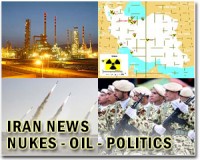 |
Tehran (AFP) Nov 23, 2010 Iran denied on Tuesday claims that its sensitive uranium enrichment work has been hit by technical problems and said its nuclear programme has not been harmed by the Stuxnet computer worm. Atomic chief Ali Akbar Salehi also rejected allegations by Western powers that Iran lacks the know-how to make nuclear fuel plates and was adamant it would be producing fuel for a research reactor by September 2011. And he welcomed the International Atomic Energy Agency's latest report on Iran, saying his country had "cooperated" with the UN nuclear watchdog. An IAEA report obtained by AFP on Tuesday said that "on November 16, no cascades (of uranium-enriching centrifuges at Iran's Natanz enrichment nuclear plant) were being fed with UF6 (uranium hexaflouride)." There was no indication yet how long the outage lasted, according to a senior diplomat familiar with the IAEA's investigation. The report did not say what the reasons for the outage might have been. And the diplomat refused to speculate that it was caused by a computer worm, called Stuxnet, that has infiltrated Iran's nuclear facilities recently. Computer security firm Symantec said last week that Stuxnet might have been designed to disrupt the motors that power gas centrifuges used to enrich uranium. That has given rise to speculation the worm was intended to sabotage nuclear facilities in Iran, especially the Russian-built atomic power plant in the city of Bushehr. Salehi "denied (media) reports and what has appeared in the IAEA report about a one-day halt of enrichment activities in Natanz," the ISNA news agency said. "In an enrichment plant centrifuges are always being installed, operated, repaired and replaced and this is natural," he said. He made a similar denial earlier in the day before the IAEA report was made public. He appeared to be reacting to comments by Olli Heinonen, former IAEA deputy director, who said on Monday that technical problems were slowing down Iran's uranium enrichment. Centrifuges for enrichment were operating at only 60 percent of capacity and Iran for some reason has removed hundreds of the machines, he said, and "this indicates there is a problem." In February, Iran started refining uranium to 20 percent purity after a deadlock over a nuclear fuel swap deal drafted by the IAEA and aimed at providing fuel for the Tehran medical research reactor. Salehi said on Tuesday the enrichment process was continuing apace. "By the month of Shahrivar next year (September 2011), we will produce fuel for the reactor," he was quoted as saying by IRNA. He also repeated denials by Iran that Stuxnet had harmed its nuclear programme. "This virus bumped into a dead-end, a wall, and the enemies could not achieve the goals they had hoped for in the past one and a half years," he said. Iran has been slapped with four sets of UN Security Council sanctions over its refusal to suspend enrichment. Enriched uranium can be used as fuel to power nuclear reactors as well as to make the fissile core of an atom bomb. Tehran has repeatedly denied Western accusations that it is working to produce a nuclear bomb. The IAEA report revealed that Iran has now amassed a stockpile of 3,183 kilogrammes (7,003 pounds) of low-enriched uranium and 33 kilos of 20 percent enriched uranium. Stalled negotiations between world powers and Iran over Tehran's nuclear programme are now likely to resume on December 5 in Geneva, according to top European Union diplomat Catherine Ashton, for the first time since October 2009. Referring to the IAEA report, Salehi said it had "improved in comparison with the past and we regard this as a good sign. However, the content is similar to those before." "There might be different interpretations of cooperation, but Iran will continue to cooperate with the agency within the safeguard agreement and there is no reason to cooperate beyond that," he added. The report complained that little had changed by way of the IAEA's overall investigation. It also said Iran was refusing to halt enrichment and to answer questions that the nuclear watchdog has had for the past two years about a possible military dimension to its nuclear work. The nine-page document has been circulated to IAEA member states and will be discussed by the agency's 35-member board of governors at the beginning of December.
Share This Article With Planet Earth
Related Links Learn about nuclear weapons doctrine and defense at SpaceWar.com Learn about missile defense at SpaceWar.com All about missiles at SpaceWar.com Learn about the Superpowers of the 21st Century at SpaceWar.com
 US stresses Iran's 'continued failure' to comply with IAEA
US stresses Iran's 'continued failure' to comply with IAEAWashington (AFP) Nov 23, 2010 The United States Tuesday criticized Iran for its "continued failure" to cooperate with the International Atomic Energy Agency, after a new report by the agency said Iran was still refusing to halt uranium enrichment. "We're obviously studying the report, but the key point is that it underscores Iran's continued failure to comply with its international nuclear obligations and also a sustain ... read more |
|
| The content herein, unless otherwise known to be public domain, are Copyright 1995-2010 - SpaceDaily. AFP and UPI Wire Stories are copyright Agence France-Presse and United Press International. ESA Portal Reports are copyright European Space Agency. All NASA sourced material is public domain. Additional copyrights may apply in whole or part to other bona fide parties. Advertising does not imply endorsement,agreement or approval of any opinions, statements or information provided by SpaceDaily on any Web page published or hosted by SpaceDaily. Privacy Statement |